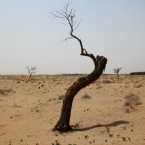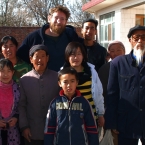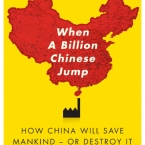A Journey to the Hotspots of China’s Environmental Crisis
China may be the epicenter of the global environmental crisis. Along the Yangtze, Yellow and Pearl rivers, fragile ecosystems meet the world’s largest population and most rapacious economy. In an epic journey, Jonathan Watts, the Guardian’s Asia environment correspondent, has visited the places where the world’s factory is bursting at the environmental seams. In a new book, he reports what he has seen.
On his journey, Watts passes through the logging towns of China’s far North and the cancer villages of industrial Henan. He visits tiger farms in the mountains of Guizhou, and stomps through the computer graveyards of Guangdong. He travels to the world’s most polluted city in the mining belt of Shanxi, and to the rapidly shrinking glaciers of Xinjiang. Watts follows the new railway to the mineral-rich Tibetan plateau, which he likens to the opening of the American West in the 19th century. And he finds himself in a glamorous Barbie showroom in one of Shanghai’s glitzy shopping malls.
Most of the places which our traveler visits are not pretty. China is paying a hefty price for its intensive agriculture, breakneck industrialization, and rapid urbanization. Lush forests have given way to dust bowls and industrial wastelands. Plant and animal species are becoming extinct at a rapid pace. Millions of people are being displaced from lands that cannot sustain them anymore. Birth defects in some places reach 20 times the global average, and whole villages are dying of AIDS due to a cynical blood donation business.
Affected people are protesting against abuses, and courageous civil society activists have taken up their cause. In 2005, China registered 5,000 mass incidents and 128,000 smaller conflicts over environmental concerns. “With no democracy, China’s government is being held accountable by riot,” comments Watts.
During his 100,000 miles journey, the author also finds the signs of a greener future – innovative green laboratories, eco-cities and the wind farms which spruce up in the steppes of Gansu and Inner Mongolia at a rapid pace. Yet even though China leads the world in the development of renewable energy, hundreds of millions of workers and farmers strive to join the American way of life, and the country’s urbanization will continue. Their demand will require a further growth of mining, logging and coal consumption. “The result is neither red nor green,” comments Watts; “it is black or grey.”
The six-month trip to the far corners of the Middle Kingdom is a tough slog for the author and his readers. The Chinese actors whom we meet pass so quickly that we rarely get to know them as individual people. The traveler keeps our interest alive through his own curiosity and his thoughtful insights into Chinese politics and culture. “China’s political system now exhibits the worst elements of dictatorship and democracy,” Watts observes: “power lies neither at the top nor at the bottom, but within a middle class of developers, polluters, and local officials who are difficult to regulate, monitor, and challenge.”
Jonathan Watts understands that the world’s environmental problems were not made in China, but, he says, “they are sliding past the point of no return here.” The ultimate villain of his book is not the gritty miner from Shanxi, but the friendly shopper in Shanghai who, according to a survey, owns an average of two cell phones, 1.7 air conditioners, 1.7 television sets, and more than one fridge. The coal miners have been recognized as a problem, but the shoppers, who keep the wheels of mining and pollution turning, are being heralded as the saviors of the global economy. Nobody wants to stop them.
“It is unreasonable to ask China to save the world,” Jonathan Watts writes at the end of his important book, “but the country forces mankind to recognize that we are all going in the wrong direction. Here, more than anywhere, the current path of human progress looks certain to lead to destruction. Here, more than anywhere, we all need to look forward and step back.”
Jonathan Watts, When a Billion Chinese Jump, How China Will Save Mankind – Or Destroy It, Paperback, Scribner, 435 pages
Peter Bosshard is the policy director of International Rivers. He blogs at www.internationalrivers.org/en/blog/peter-bosshard






